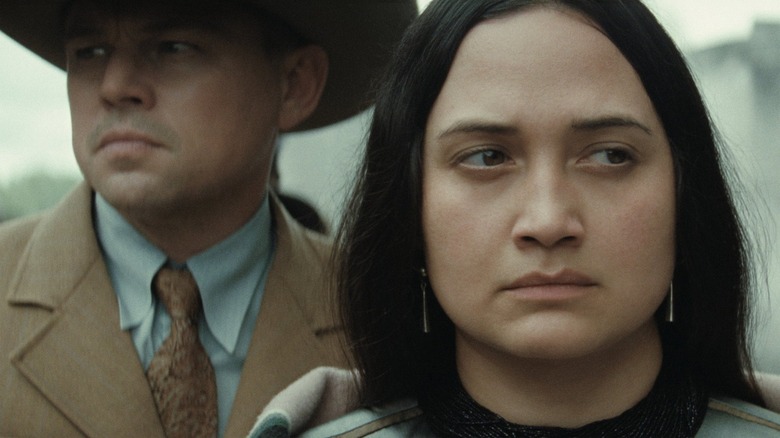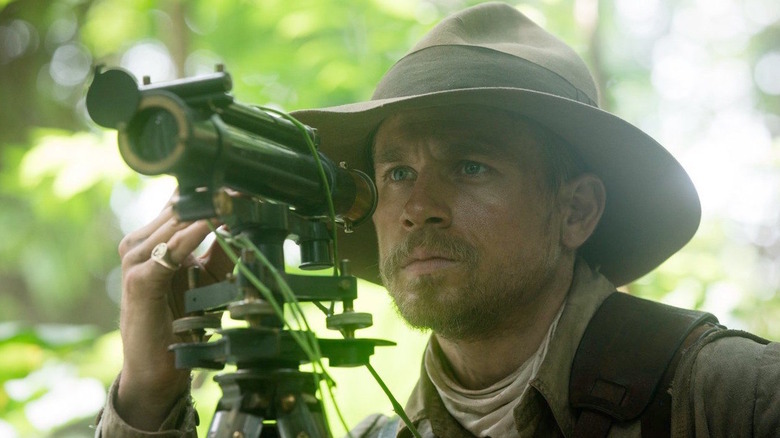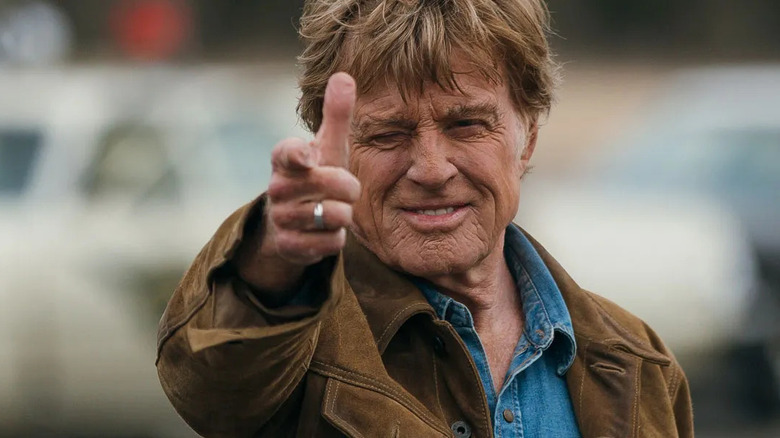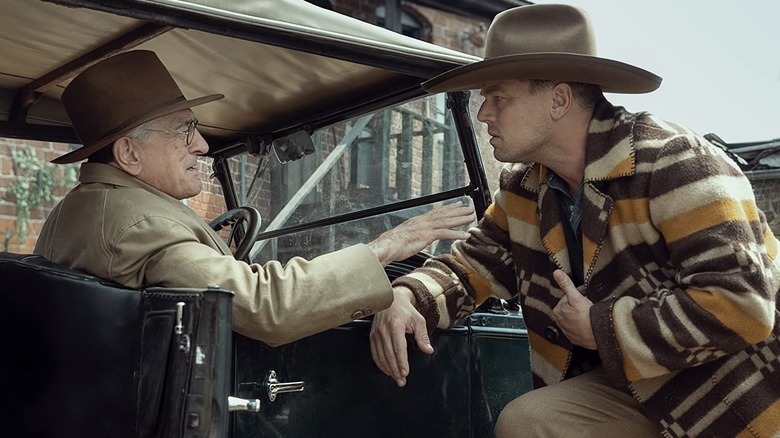Why Hollywood Keeps Turning To Killers Of The Flower Moon Writer David Grann
Every 10 years or so, Hollywood seems to fall head over heels in love with a writer. In the 1990s, studios couldn't stop turning John Grisham's legal drama/thriller novels into movies. (That and "Christmas with the Kranks" — yes, in case you didn't know, Tim Allen and Jamie Lee Curtis's 2004 holiday farce was based on a book by the author of "The Firm" and "A Time to Kill.") Such was also the case with romance novelist Nicholas Sparks, starting with "Message in a Bottle" in 1999 and stretching on throughout the 2000s and a little beyond.
More recently, journalist and writer David Grann has quietly emerged as the hot new thing in Tinseltown. His book "Killers of the Flower Moon" is now a $200 million, three-hour epic directed by Martin Scorsese and starring Leonardo DiCaprio, and the screen rights to his newest work, "The Wager: A Tale of Shipwreck, Mutiny, and Murder," were acquired by Scorsese and DiCaprio before it was even published. Recent years have also seen Grann's book "The Lost City of Z: A Tale of Deadly Obsession in the Amazon" and his New Yorker article "The Old Man and the Gun" turned into acclaimed movies by the likes of James Gray and David Lowery. But what is it that makes Grann's storytelling so appealing to filmmakers?
Truth is stranger than fiction
David Grann deals pretty much exclusively in non-fiction literature, in keeping with his background as a magazine staff writer and editor. But he doesn't just deal in real-life stories; he deals in the lives of people whose exploits tend to read like the invention of a wordsmith eager to make some grandiose observations about the human condition.
Consider "The Lost City of Z." It's a story about English explorer Percy Fawcett and how a mission appointed to him by the Royal Geographical Society in the early 20th century — mapping the border between Brazil and Bolivia so as to help settle a dispute between the countries — led to him becoming obsessed with proving the existence of an ancient civilization in the Amazonian jungle. If you didn't know any better, you might assume "The Lost City of Z" was a fictional morality tale in the vein of "The Treasure of the Sierra Madre," wherein a group of characters go on an adventure that exposes society's failings, spurring them to value the wrong things (in Fawcett's case, his fixation on restoring his family's tarnished name and stature) and leading them down a path to tragedy. Except, Fawcett was an actual person and his life wasn't just a parable, it really happened.
By that same token, the namesake in "The Old Man & the Gun," Forrest Tucker, was a career criminal whose lifelong habit of politely robbing banks in between breaking out of the slammer is based in reality, unlike the antics of the equally well-mannered, prison-escaping "Sleepover Bandits" from Barry Levinson's underrated crime dramedy "Bandits." There's no need to make up whimsically melancholic metaphors for the way we spend our lives doggedly pursuing our passions — even after they're no longer practical — when people like Tucker already exist.
Genre movies with a twist
Another perk to adapting David Grann's non-fiction stories is that they rarely follow Hollywood conventions since, you know, life tends to work differently than it does in the movies. Indeed, the less-successful Grann film adaptations "Trial By Fire" and "Dark Crimes" were both widely derided by critics for wasting fascinating fact-based stories from the author's celebrated essay collection, "The Devil and Sherlock Holmes: Tales of Murder, Madness, and Obsession" (which also includes the source material for "The Old Man & the Gun"), and turning them into contrived, manipulative drivel.
Comparatively, "The Lost City of Z" is an old-school exploration adventure film that subverts your expectations of the genre, forgoing easy thrills in favor of a meditative character study. "The Old Man & Gun" does something similar, starting out as what seems like a standard heist dramedy — albeit one where the members of the heist crew are all senior citizens — before steadily revealing itself as something far more character-focused. And while Martin Scorsese's "Killers of the Flower Moon" adaptation appears to be taking its own unique approach to its source material (which includes casting Leonardo DiCaprio as a character who's morally ambiguous at best), Grann's original book very much plays as a typical murder-mystery starting out, only to take some shocking twists and turns as the sordid truth about what's really going on comes to light.
Indeed, this description could apply to virtually every story in "The Devil and Sherlock Holmes," which explains why so many of them have already been adapted for the screen. In fact, even some of the ones that haven't been technically adapted have inspired films of their own, like "The Chameleon" (an essay about serial imposter Frédéric Bourdin, himself the subject of Bart Layton's award-winning documentary "The Imposter").
The problem with Grann's work
Beyond their engrossing subject matter and convention-defying plots, the thing that makes David Grann's work so topical is that it shines a light on the dark corners of history many would rather forget, including the legacy of Western colonialism and imperialism, as well as the historical genocide against Native Americans. However, this has also (and fairly) been a point of contention when it comes to Grann, what with so many of his narratives being told from the point-of-view of white people.
Historian/explorer John Henry Hemming, who specializes in Amazon's Indigenous peoples, took both Grann and the "Lost City of Z" film adaptation to task for this exact reason. In a piece for The Spectator, Hemming dismissed Grann citing his own "three-volume, 2,100-page history of Brazilian Indians and five centuries of exploration" as a primary source of information for his work, describing much of his book and the movie it inspired as "artistic license and hype of an absurd order." Hemming didn't mince words about Percy Fawcett, either, calling him "a nutter [and] a racist" whose greatest triumph was propagating myths about his so-called discoveries.
Personally, I agree "The Lost City of Z" should've gone further in examining Fawcett's racism. I also feel "Killers of the Flower Moon" suffers from depicting too much of its story from a white perspective, as opposed to that of the members of the Osage Nation it focuses on. That said, I'm glad to hear Martin Scorsese changed his approach to "Flower Moon" after meeting with the present-day Osage Nation, so as to ensure they're more authentically represented ... although that doesn't automatically give him a free pass for telling a story that feels like it should've been handled by an Indigenous filmmaker (no matter how well it turns out).
"Killers of the Flower Moon" will open in theaters on October 6, 2023.



